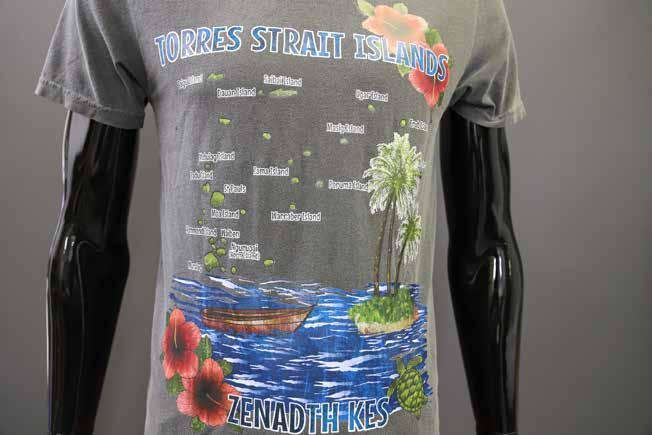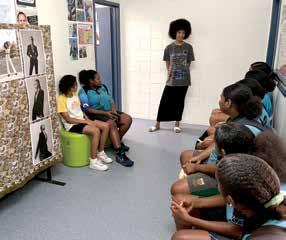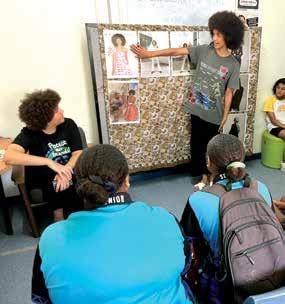
2 minute read
More than a fashion statement: sister role models come home to share life knowledge and experiences
STORY BY CARLI WILLIS
Zenadth Kes sisters Sene and Waniki Maluwapi have been making waves around the continent raising some fashionable awareness around climate change impacts in the Torres Strait.

Recently the pair visited Waibene Koey Ngurpay Mudh (Tagai State College) to share some of their experiences in the national fashion industry and climate advocacy.

Sene was a Miss Universe Australia finalist in the youngest age group of the runway, and set to compete later this year.
She said she hoped the international spotlight would be an opportunity to elevate awareness around Zenadth Kes culture and the climate change impacts that threaten it.
“For me, it’s not the photoshoots the glamour, it’s fun, but the biggest most rewarding part for me is the reaction from community and how everyone feels when I am doing all that,” she said.
“Always remember who you are and who come before you.”
Waniki works with environmental group 350.org advocating for renewable energy and climate justice.
Last year at Australian Fashion week 350.org, in collaboration with First Nations Fashion and Design, raised awareness for climate change through runway performance.
“As Torres Strait Islanders, we love island homes, our families, our culture,” she said.
“Climate change is something that threatens that every day.
“Climate Action doesn’t just look like protesting.
“It can look like gathering stories from our Elders, sitting down, learning about the stories of our islands, and documenting so people on the mainland, and also around the world, sabe that this is something that is happening.”
Malaria on Saibai/Boigu
Three cases of malaria have been detected on Saibai Island following a case detected on Boigu Island in early July, Torres & Cape Hospital and Health Service (TCHHS)

Public Health Medical Officer Dr Allison Hempenstall says.
“The Boigu and the Saibai cases are being managed appropriately and no further details can be provided due to confidentiality,” she said.
“It’s been a great joint effort between the TCHHS Public Health Unit, the Tropical Public

Health Service in Cairns, our staff at the Boigu and Saibai primary health care centres, and our local councils to respond to these cases and I’d like to thank all the teams involved for their ongoing work.”
She said the community should be aware malaria was treatable and there was no cause for community alarm.
“Malaria is a mosquito-borne disease and is not transmitted from person to person,” she said.
“It is spread to people by the bite of particular types of mosquitoes.
She said the most common symptoms of malaria were high fever, headache, backache, nausea, vomiting, and muscle and joint pains.
She said all residents of Boigu and Saibai Islands, and across the Torres Strait, Northern Peninsula Area and Cape York, should do their part and take action to eliminate mosquito breeding sites on their properties, and protect themselves from mosquito bites, as a matter of urgency.
The visit to the school was hosted by a group of young women known as ‘Kayin Ipikazil’, which means ‘Young Women’ in Kalaw Lagaw Ya language, who work in partnership with Koey Ngurpay Mudh. Kayin Ipikazil work to create environments and events where young women can work with and foster relationships with mentors.






